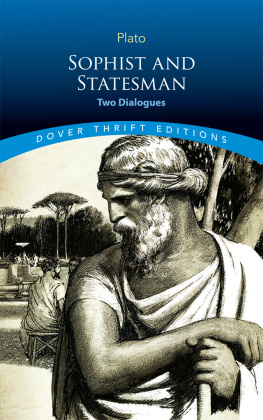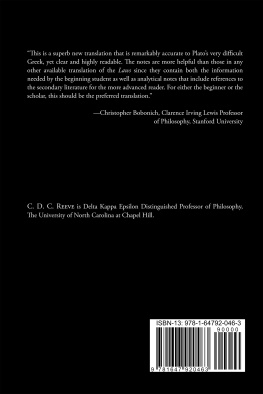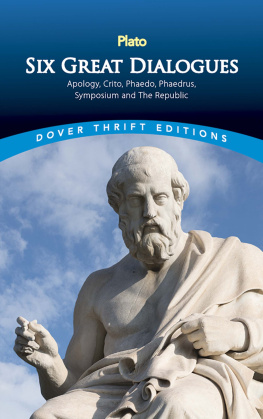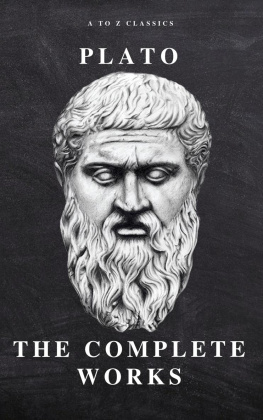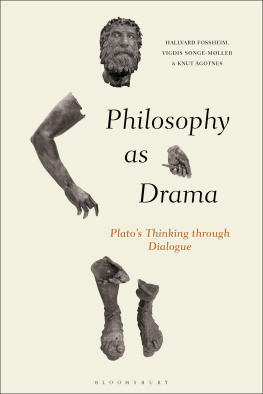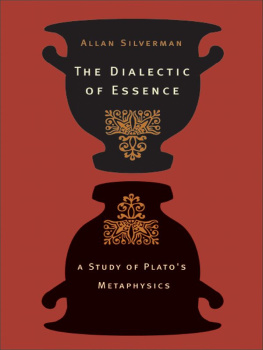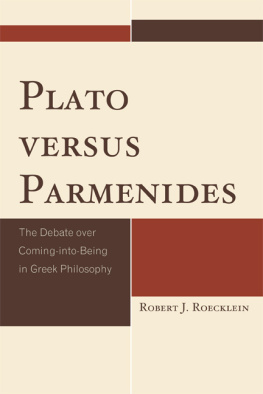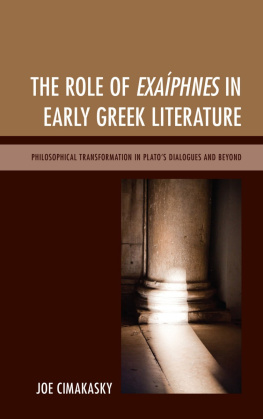SOPHIST AND STATESMAN
Two Dialogues

Plato
DOVER THRIFT EDITIONS
MINEOLA, NEW YORK
DOVER THRIFT EDITIONS
GENERAL EDITOR: SUSAN L. RATTINER
EDITOR OF THIS VOLUME: TERRI ANN GEUS
Bibliographical Note
This Dover edition, first published in 2018, is a new selection of two dialogues from The Works of Plato, translated into English by Benjamin Jowett, published by Random House, New York, in 1937. A Note has been specially prepared for this edition.
Library of Congress Cataloging-in-Publication Data
Names: Plato, author. | Jowett, Benjamin, 18171893, translator. | Plato. Sophist. English. | Plato. Statesman. English.
Title: Sophist and Statesman : two dialogues / Plato.
Description: Mineola, New York : Dover Publications, Inc., 2018. | Series: Dover thrift editions | This Dover edition, first published in 2018, is a new selection of two dialogues from The Works of Plato, published by Random House, New York, in 1937. A Note has been specially prepared for this edition.
Identifiers: LCCN 2017029138| ISBN 9780486813448 | ISBN 0486813444
Subjects: LCSH: Logic, Ancient. | Meaning (Philosophy)Early works to 1800. Political scienceEarly works to 1800.
Classification: LCC B358 .J82 2018 | DDC 184dc23
LC record available at https://lccn.loc.gov/2017029138
Manufactured in the United States by LSC Communications
81344401 2018
www.doverpublications.com
Note
GREEK PHILOSOPHER, DISCIPLE of Socrates, and teacher of Aristotle, Plato (c. 427347 B.C.) ranks as one of the most influential thinkers in Western history. As a young man Plato harbored political aspirations, but his hopes for reform of Athenian politics and society were dealt a severe blow when Socrates, his teacher and the foremost philosophical thinker of the period, was sentenced to death for corrupting the young and undermining established religious beliefs.
Following the death of Socrates, Plato traveled extensively in Greece, Egypt, Italy, and Sicily. Returning to Athens after twelve years, he founded the Academy in 387 B.C. An institution devoted to philosophical and scientific research, the Academy absorbed Platos energies for the rest of his life. The great man lectured extensively at the Academy, and wrote on many philosophical issues, especially concerning himself with politics, ethics, metaphysics, education, epistemology, and the philosophy of mathematics. The most important writings of Plato are his dialogues, all of which are thought to have survived intact. In the dialogues, Plato employed the Socratic method of question-and-answer dialectic to investigate concepts, not so much as to define a position as to stimulate an ongoing, open, and wide-ranging discussion of a host of philosophical issues. While the early dialogues are thought to have been heavily influenced by Socrates and his methods, the later ones are considered to reflect more of Platos own mature thought and some distancing between himself and his early mentor.
The present volume contains two dialogues from the philosophers late period. The dialogues for the Sophist and its sequel, the Statesman, are unusual because, unlike earlier dialogues, Socrates is present only to play a minor role. The conversations in the Sophist and Statesman take place sequentially on a single day and are dramatically linked to the Theaetetus, which occurred on the previous day, shortly before Socrates trial and death.
Contents
SOPHIST
SOPHIST
PERSONS OF THE DIALOGUE
THEODORUS THEAETETUS SOCRATES
AN ELEATIC STRANGER, whom Theodorus and Theaetetus bring with them. The younger SOCRATES, who is a silent auditor.
Theodorus. HERE we are, Socrates, true to our agreement of yesterday; and we bring with us a stranger from Elea, who is a disciple of Parmenides and Zeno, and a true philosopher.
Socrates. Is he not rather a god, Theodorus, who comes to us in the disguise of a stranger? For Homer says that all the gods, and especially the god of strangers, are companions of the meek and just, and visit the good and evil among men. And may not your companion be one of those higher powers, a cross-examining deity, who has come to spy out our weakness in argument, and to crossexamine us?
Theod. Nay, Socrates, he is not one of the disputatious sorthe is too good for that. And, in my opinion, he is not a god at all; but divine he certainly is, for this is a title which I should give to all philosophers.
Soc. Capital, my friend! and I may add that they are almost as hard to be discerned as the gods. For the true philosophers, and such as are not merely made up for the occasion, appear in various forms unrecognized by the ignorance of men, and they hover about cities, as Homer declares, looking from above upon human life; and some think nothing of them, and others can never think enough; and sometimes they appear as statesmen, and sometimes as sophists; and then, again, to many they seem to be no better than madmen. I should like to ask our Eleatic friend, if he would tell us, what is thought about them in Italy, and to whom the terms are applied.
Theod. What terms?
Soc. Sophist, statesman, philosopher.
Theod. What is your difficulty about them, and what made you ask?
Soc. I want to know whether by his countrymen they are regarded as one or two; or do they, as the names are three, distinguish also three kinds, and assign one to each name?
Theod. I dare say that the Stranger will not object to discuss the question. What do you say, Stranger?
Stranger. I am far from objecting, Theodorus, nor have I any difficulty in replying that by us they are regarded as three. But to define precisely the nature of each of them is by no means a slight or easy task.
Theod. You have happened to light, Socrates, almost on the very question which we were asking our friend before we came hither, and he excused himself to us, as he does now to you; although he admitted that the matter had been fully discussed, and that he remembered the answer.
Soc. Then do not, Stranger, deny us the first favour which we ask of you: I am sure that you will not, and therefore I shall only beg of you to say whether you like and are accustomed to make a long oration on a subject which you want to explain to another, or to proceed by the method of question and answer. I remember hearing a very noble discussion in which Parmenides employed the latter of the two methods, when I was a young man, and he was far advanced in years.
Str. I prefer to talk with another when he responds pleasantly, and is light in hand; if not, I would rather have my own say.
Soc. Any one of the present company will respond kindly to you, and you can choose whom you like of them; I should recommend you to take a young personTheaetetus, for exampleunless you have a preference for some one else.
Str. I feel ashamed, Socrates, being a new-comer into your society, instead of talking a little and hearing others talk, to be spinning out a long soliloquy or address, as if I wanted to show off. For the true answer will certainly be a very long one, a great deal longer than might be expected from such a short and simple question. At the same time, I fear that I may seem rude and ungracious if I refuse your courteous request, especially after what you have said. For I certainly cannot object to your proposal, that Theaetetus should respond, having already conversed with him myself, and being recommended by you to take him.

